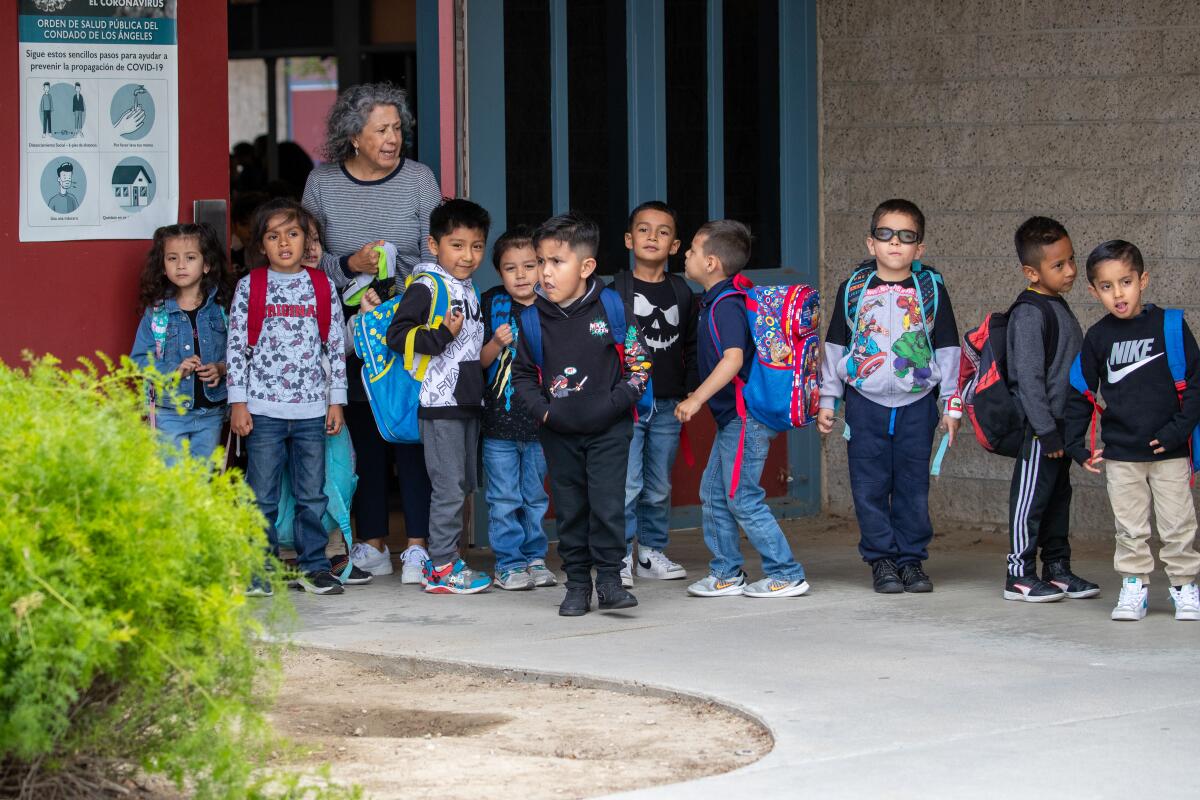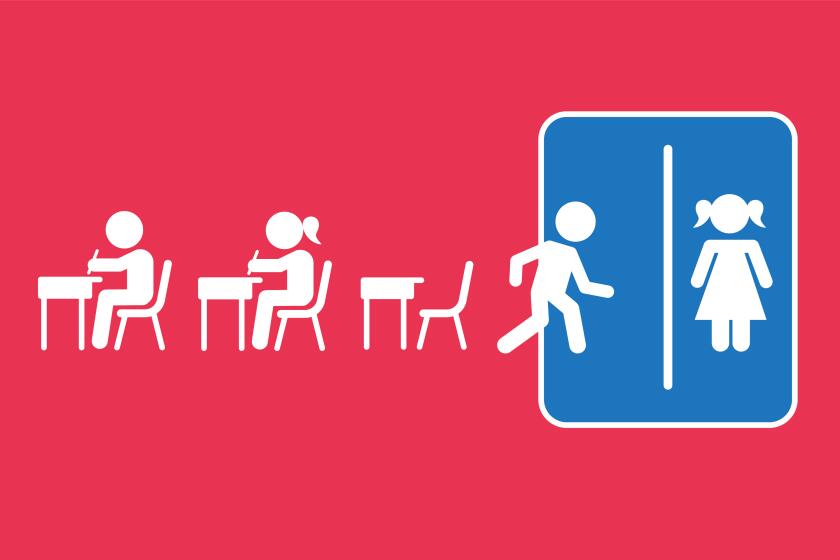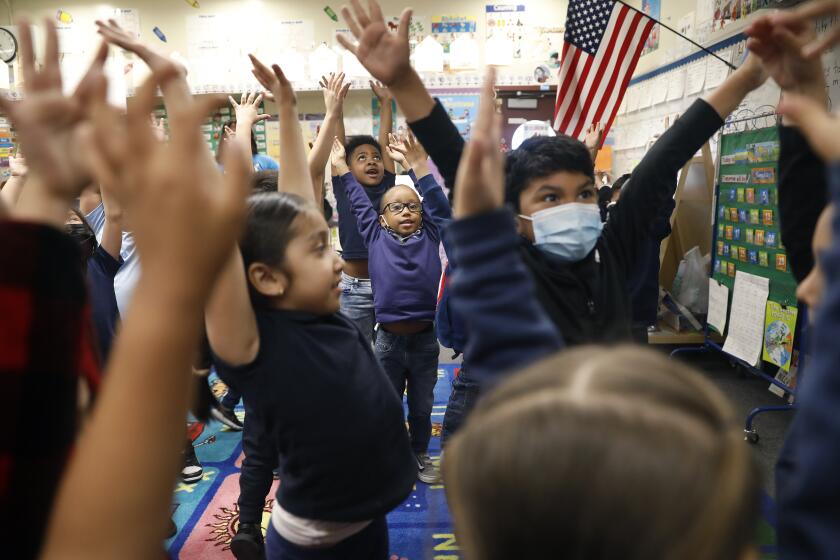Nervous about the first day of school? Get your little one ready with these tips

- Share via
First day of school jitters are natural for both young learners and parents — especially as California elementary schools are enrolling 4-year-olds in transitional kindergarten.
Whether your child is away from home for the first time or transitioning from preschool to elementary school, there are ways to prepare them — and yourself.
For the record:
5:10 p.m. Aug. 14, 2023An earlier version of this story incorrectly said Gennie Gorback was the past board president of the California Kindergarten Assn. She is the past president.
It’s not yet time to worry about academics, said Gennie Gorback, the past president of the California Kindergarten Assn. The first few weeks of school are about getting your child acclimated to the new environment and comfortable with the transition.
Here are some first-day-of-school preparation tips from educators:
Have your child practice being independent
Make sure your youngster can handle what will be expected of them. Have them practice putting on their backpack on their own, opening and closing their lunch containers and tightening their shoes. Remember, shoelaces might not be developmentally appropriate for some children, Gorback said.
California’s 4-year-olds are entering transitional kindergarten. But many young learners aren’t fully potty-trained, an issue public schools are grappling with.
Transitional kindergarten children in public schools will have to go to the bathroom completely on their own, which can be difficult. Build their confidence. Make sure they are able to wipe themselves and pull up their pants without assistance. School districts throughout California have different policies on helping children. Some have aides that can assist. In others, children will be on their own and will be sent to the nurse’s office if they have an accident. In some districts, parents will be called.
Check with your school on bathroom policies and whether to pack an additional set of clothing.
Create a routine and familiarize them with the idea of school
Get your child settled into a routine as the first day nears. Put them to bed earlier and have them practice getting up on time, said Ana Tramp, who teaches transitional kindergarten, or TK, in Pomona Unified.
Drop by your elementary school before the first day and take a walk through campus if you can. Explain to your child what they should expect once they start and start using their teacher’s name so that they grow familiar with it. If your school has an orientation or welcome event, attend. If not, reach out to the teacher on your own. It helps the child to meet the teacher with the parent present, said Karina Hanna, who teaches transitional kindergarten for Los Angeles Unified.
You can also read to your child to get them used to sitting still for story time, Gorback said. But don’t worry if they still need a bit of practice with that during the early days of school. Learning school structure is a big part of the first year.
“TK or kindergarten — depending on the kid’s background — is teaching them to do school, introducing them to the concept of sitting at circle time, introducing them to the concept of lining up, introducing them to the concept of following directions,” Gorback said.
As California expands access to transitional kindergarten for all 4-year-olds, districts across the state struggle to recruit and accommodate young learners.
Pack a comfort item
Pack a picture of the family in your child’s backpack that they can look at for reassurance when they’re feeling anxious or sad. Have your child wear a special bracelet or bring a special keychain or sticker with them to school as a reminder of your love.
Schools have different rules about what students can bring with them to avoid distraction. But if allowed, Tramp recommends packing their favorite book. Sometimes she’ll read the book aloud to calm them down.
“Call the office and find out what they can bring with them,” Tramp said. “You might be surprised. There are some features that might allow them to bring a selfie of something that will make them more comfortable while they’re sitting there at school.”
Be on time and don’t linger on the first day
Drop-offs can be difficult in the beginning. Bring your child to school on time so that they don’t have to enter the classroom when everyone is already settled, Hanna said. Make sure your child knows exactly what to expect: who will pick them up, how long the day is, what they’ll be eating. When you’re picking them up, be sure to arrive on time so as not to cause extra stress, said Bernadette Zermeño, a board member of the California Kindergarten Assn.
“Give yourself enough time to find parking and not rush because kids really feel it when they see everyone else’s parents and their parents aren’t there,” she said.
The first day of school can be just as hard on the parents as it is on the kids. But it’s important to be positive as you leave them at school for the first time because kids can sense their parents’ anxiety. Don’t linger because that could make your child more upset.
Get informed and stay engaged
Make sure you know what to expect on the first day too. Ask your school about how school dropoff and pickup work, learn security measures at your school and be familiar with what the cafeteria is serving for lunch.
Get to know your child’s teacher and share with them any information they may need to know, including allergies and behavioral issues as soon as you can. Be on top of the information the school shares with parents. Read emails and letters so that you know about events and about what your child’s learning in class.
If you’d like to participate, volunteer or go to back-to-school and other campus events. If you choose to volunteer, Hanna recommends waiting a month or so first so that your child can acclimate on their own.
As the school year starts, engage with your child about what they’re learning. Ask them specific questions about their day, their friends and how they’re feeling. Speak to your children about what they are learning in their native language. This will help improve their native vocabulary and also make it easier for them to learn English, said Zermeño, who is a multilingual specialist for Oakland Unified and a former transitional kindergarten teacher.
Remember, it’s OK if your child is exhausted or has a meltdown after school, Gorback said. They’ve been on their best behavior all day. Give your child grace and some quiet time or a hug as they begin their new journey.
This article is part of The Times’ early childhood education initiative, focusing on the learning and development of California children, from birth to age 5. For more information about the initiative and its philanthropic funders, go to latimes.com/earlyed.
More to Read
Sign up for Essential California
The most important California stories and recommendations in your inbox every morning.
You may occasionally receive promotional content from the Los Angeles Times.













